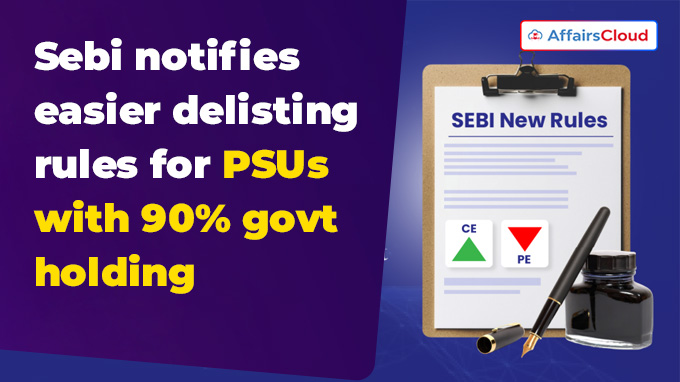 In September 2025, the market regulator Securities and Exchange Board of India (SEBI), introduced special relaxations for Public Sector Undertakings (PSUs) in which the government already holds 90% or more equity.
In September 2025, the market regulator Securities and Exchange Board of India (SEBI), introduced special relaxations for Public Sector Undertakings (PSUs) in which the government already holds 90% or more equity.
- The new framework aims to simplify the voluntary delisting process for state-owned companies, ensuring a more practical and efficient approach to their market exit.
Exam Hints:
- What? SEBI’s relaxation for PSUs delisting & revises InvITs investment
- PSUs delisting: for PSUs in which government holds 90% or more equity.
- Not Applicable to: NBFC, Insurance companies
- Major Amendments: PSUs can now delist at a fixed price,
- Other amendments: new pricing mechanism, settlement time
- InvIT norms? SEBI slashes min investment in InvIT to Rs. 25 lakhs
- Related party: Not classified under public category, including QIBs
Key relaxations: SEBI has provided relaxations from the requirement of a two-thirds threshold for approving delisting by public shareholders and in the mode of computation of the floor price.
- The traditional reverse book-building (RBB) mechanism has been replaced with a fixed price approach, provided certain valuation conditions are met.
Not Applicable to: The SEBI stated that the new rule applies to PSUs, excluding banks, Non-Banking Financial Companies (NBFCs), and insurance companies, where the government holds a 90% or greater stake.
New Pricing: The PSUs can now delist at a fixed price, provided it is at least 15% above the floor price (FP), regardless of recent trading activity in the stock.
Old Pricing calculation: Under the earlier rules, the FP or delisting is calculated using several pricing metrics such as the 60-day average price and the highest price in the last 26 weeks.
New Pricing calculation: The FP of delisting will be the highest among three benchmarks:
- The volume-weighted average price of trades over the 52 weeks up to the reference date. The maximum price paid over the 26 weeks before the reference date.
Settlement: If a shareholder does not submit their shares within the one-year exit window, the company is required to deposit the pending amount in a designated account with the stock exchange within 30 days following the closure of the window.
- The money will be held for 7 years, allowing investors ample time to claim their dues.
Sebi revises InvITs norms, minimum investment slashed to Rs.25 lakh
In September 2025, SEBI has issued regulations to reduce the minimum allotment lot size in the primary market for privately placed Infrastructure Investment Trusts (InvITs) to Rs. 25 lakh, harmonizing it with the secondary market norms.
Preceding: Earlier, the minimum allotment lot for privately placed InvITs in the primary market was either Rs. 1 crore(cr) or Rs. 25 cr, based on the asset composition.
- Secondary Market trading lot size had already been reduced to Rs 25 lakh in an earlier round of reforms, irrespective of the asset mix.
Related Parties: Under the norms, SEBI has clarified that related parties of the Real Estate Investment Trust (REIT)/InvIT and of the Sponsor, Investment Manager, or Project Manager will not be considered under the public category, and this exclusion applies even if they are Qualified Institutional Buyers (QIBs).
- The amendment now facilitates the classification of units held by the related parties of these entities who are QIBs as public.
Cash flow: Earlier, a holding company (holdco) was mandated to distribute 100% of the cash flows received from its underlying SPVs (Special Purpose Vehicles) to the REIT/InvIT, without adjusting for its own cash flow position (incurred losses if any).
- But now, If the Holdco’s own net distributable cash flow is negative, it is now allowed to offset this loss against the positive cash flows received from its SPVs and then distribute to the REIT/InvIT.




